Hey there, curious pet parents! Today, we’re tackling a question that’s puzzled many: “When should a dog cut off the waterworks before surgery?”
A dog should typically stop drinking water about 2–3 hours before scheduled surgery. However, always follow your vet’s specific instructions, as fasting times may vary based on the dog’s health and the type of surgery.
Picture your pup, Fido, lapping up water like there’s no tomorrow, only to hear, “No more H2O before surgery!” Cue the puppy eyes! But why the hydration hiatus? Is it a canine cleanse? Fear not; we’re about to demystify it all.
In this guide, we’ll decode the science, risks, and exceptions of pre-surgery sips. And yes, expect a dash of humor! So, grab your furry friend, and let’s navigate the world of surgeries and hydration. Let’s dive in! 🐾
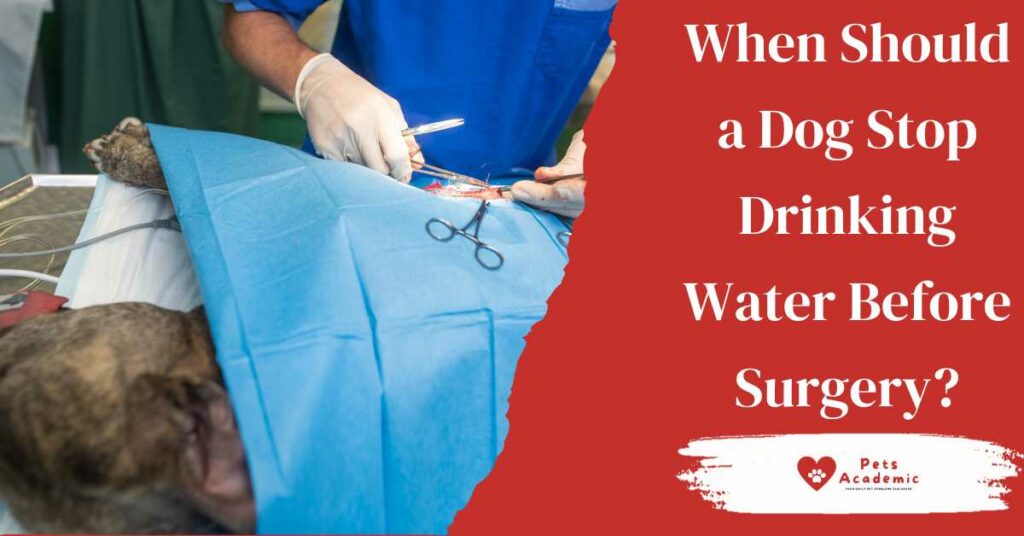
Also read: How to stop dog coughing after drinking water.
When Should a Dog Stop Drinking Water Before Surgery?
Alright, folks, let’s get down to the nitty-gritty. When should Fido bid adieu to his water bowl before going under the knife? It’s not just some arbitrary rule thrown in for good measure, I promise!
You see, surgeons aren’t trying to play a trick on your furry friend. They’re actually looking out for Fido’s well-being. Before surgery, it’s crucial to ensure your pup’s stomach is as empty as a kid’s candy bag on Halloween night. This reduces the risk of complications during the procedure.
Think about it like this: If Fido’s stomach is full of water, it could lead to some unwelcome surprises during surgery. Nobody wants that, right? So, we’re not depriving Fido out of spite; it’s all about keeping them safe and sound.
But now, you might be wondering, “How long should this water hiatus last?”
Typically, it’s recommended to stop your furry friend’s water intake about two to three hours before the scheduled surgery.
However, it’s crucial to follow your vet’s specific instructions, as the fasting time may vary based on your dog’s individual health and the type of surgery they’re undergoing.
So, grab a comfy spot because we’re about to dive into the fascinating world of pre-surgery hydration schedules!
Meanwhile, if you are wondering why your dog is scared of water, you can read all about that in this article I have written.
Why Should My Pet Stop Drinking Water Before Surgery?
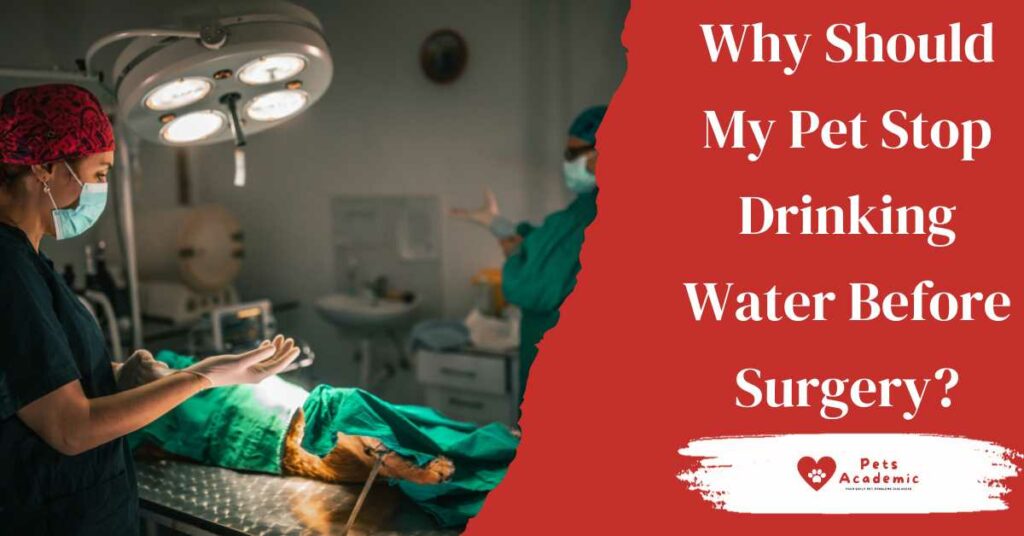
Alright, let’s break it down even further. Why is it so crucial for Fido to steer clear of that water bowl before surgery?
First and foremost, it’s all about safety.
Picture this: Your vet is like a pilot preparing for takeoff. They need a clear runway (or, in this case, an empty stomach) to ensure a smooth journey. A full stomach, on the other hand, could lead to turbulence during the procedure.
Moreover, water and anesthesia don’t exactly mix well.
A full stomach increases the risk of regurgitation, which is a scenario we definitely want to avoid.
Nobody wants a surprise splash zone in the operating room!
Now, I get it. Denying Fido that drink might feel like you’re depriving them of something they love. But think of it as a short-term sacrifice for their long-term well-being. It’s like postponing dessert for a healthier tomorrow!
So, when your vet stresses the importance of pre-surgery water restrictions, they’re not trying to be the water police. They’re looking out for Fido’s safety, ensuring a successful operation and a smoother recovery ahead.
Factors Affecting Pre-Surgery Water Intake
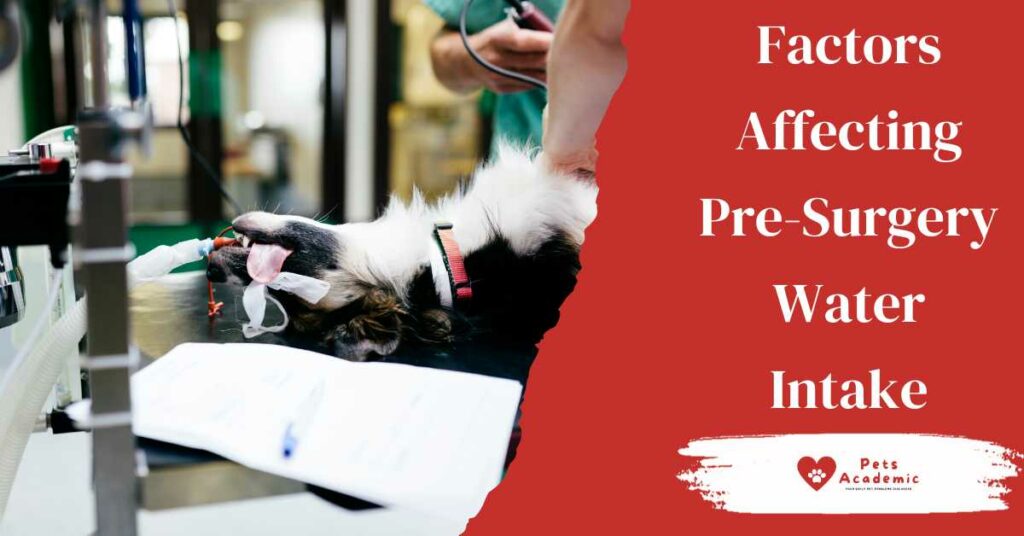
Here are the factors influencing pre-surgery water intake presented in bullet points:
- Dog’s Size: Larger dogs may have different hydration needs compared to smaller breeds.
- Age: Older dogs may have unique requirements for water intake before surgery.
- Overall Health: The dog’s general health condition is a crucial factor in determining pre-surgery water restrictions.
- Type of Surgery: The complexity and nature of the surgery can influence the guidelines for water intake.
- Underlying Medical Conditions: Any existing health issues can impact how much water the dog should have before the procedure.
- Medications: Certain medications the dog may be taking can affect their water intake recommendations.
- Veterinary Guidance: It’s vital for pet owners to closely follow the advice of their veterinarian to ensure their dog is properly prepared for a safe and successful surgery.
Potential Risks of Allowing Water Before Surgery
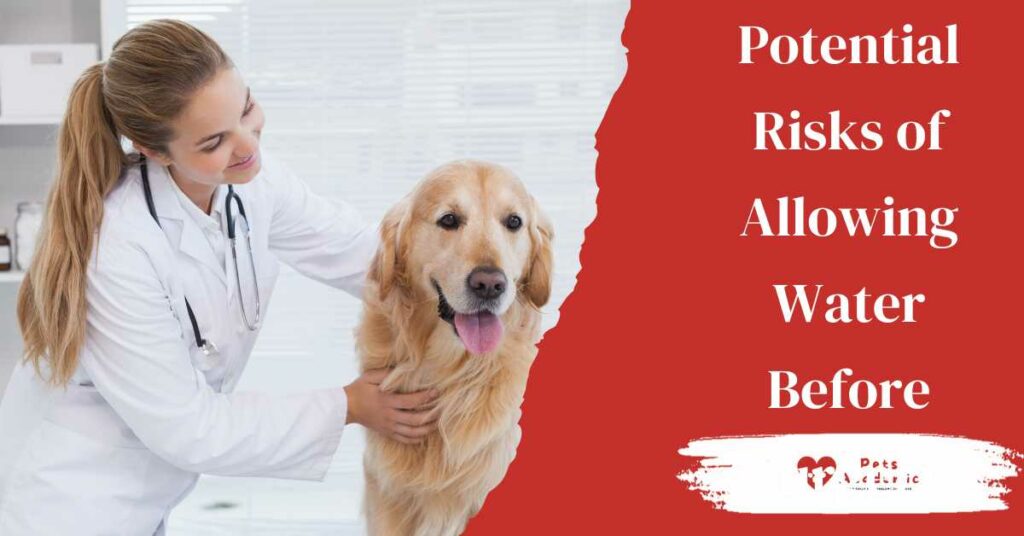
Now, you might be wondering, “What’s the harm if Fido sneaks a sip before surgery?” Well, let’s talk about the potential risks.
Imagine this scenario: Fido manages to have a drink right before surgery. Now, when anesthesia kicks in, there’s a higher chance of that water making a not-so-welcome reappearance. We’re talking about regurgitation, and trust me, it’s a situation we want to avoid at all costs.
Regurgitation during surgery can lead to a whole host of complications. It can compromise your pup’s airway, making it harder for them to breathe. Plus, it can introduce unwanted substances into the lungs, which is a recipe for post-operative problems.
In a nutshell, allowing water right before surgery is like throwing an unexpected curveball into an already delicate procedure. And no one likes curveballs during surgery, right?
So, when your vet stresses the importance of pre-surgery water restrictions, it’s not about being overly cautious. It’s about minimizing potential risks and ensuring a smooth operation for Fido.
In the next section, we’ll touch on some exceptions to the pre-surgery water rule. Stay tuned!
Exceptions to the Rule: Special Considerations for Certain Surgeries
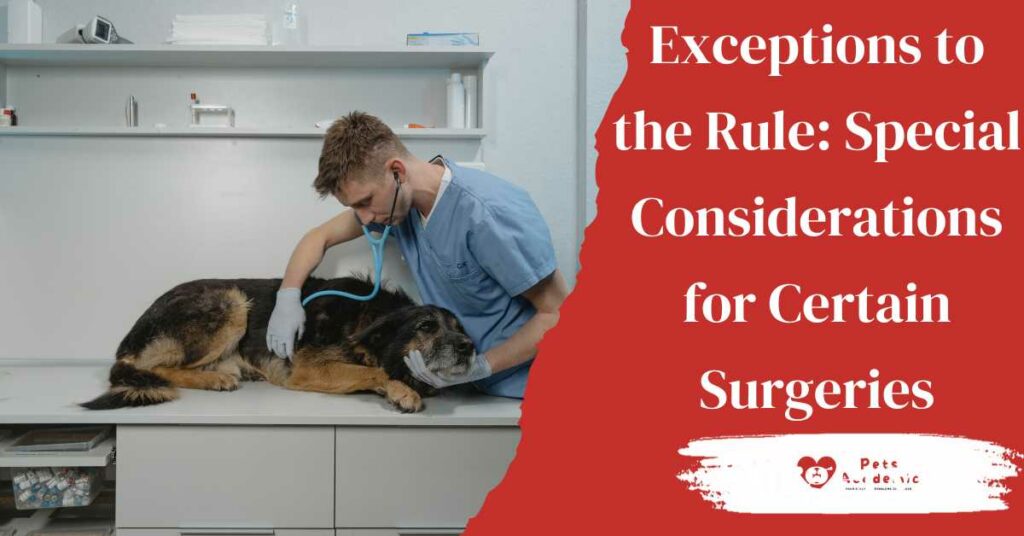
Now, let’s talk about some exceptions to the pre-surgery water rule. It turns out that not all surgeries follow the same hydration script!
For certain procedures, especially those that are more extensive or involve complex organ systems, your vet might have a slightly different approach. They may allow limited water intake closer to the surgery time.
Why? Well, it’s all about balancing hydration with the specific demands of the procedure.
In these cases, your vet will provide clear instructions on when and how much water Fido can have. It’s like a tailored hydration plan, designed to ensure Fido’s comfort and safety throughout the process.
So, if you find yourself in a situation where your vet gives the green light for some pre-surgery sips, trust that it’s a carefully considered decision aimed at optimizing Fido’s well-being.
Is the Fasting Time Different Depending on The Surgery?
You might be wondering if the pre-surgery fasting time is a one-size-fits-all scenario. Well, not quite! The fasting guidelines can vary depending on the type of surgery your furry friend is scheduled for.
For minor procedures or routine surgeries, the fasting period might be around two to three hours before the scheduled time. This allows enough time for your pup’s stomach to empty out, reducing the risks associated with anesthesia.
However, for more complex or specialized surgeries, your vet may have specific fasting instructions.
They might adjust the timing to ensure your pup’s comfort and safety throughout the procedure.
That’s why it’s crucial to follow your vet’s guidance to the letter. They know your furry friend’s unique needs and the demands of the surgery they’ll be undergoing. Think of it as a tailored suit, perfectly fitted for the occasion!
Remember, your vet’s recommendations are based on years of training and experience, so you can trust their judgment.
In the next section, we’ll tackle the scenario of accidental water intake before surgery. Stay tuned!
What If My Pet Accidentally Drinks Water Before Surgery?
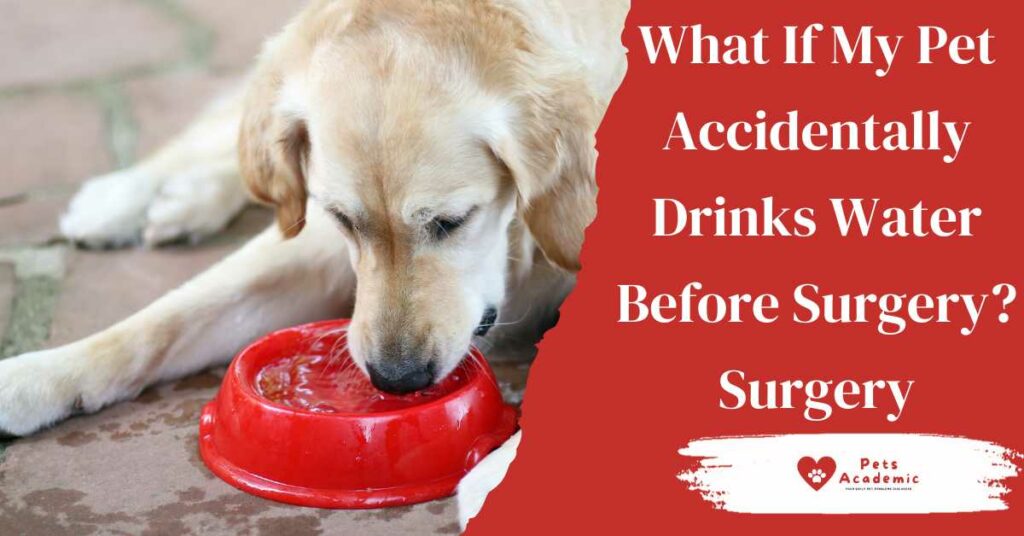
Okay, let’s say Fido sneaks in a quick sip before the surgery. It happens to the best of us, right? First off, don’t panic. It’s important to let your vet know about it.
The vet will assess the situation and decide if any adjustments need to be made to the surgical plan.
While accidental sips aren’t ideal, your vet is well-equipped to handle unexpected twists in the pre-surgery routine.
So, keep calm, let them know, and trust in their expertise. They’re there to ensure Fido’s well-being throughout the entire process.
Water Intake and Anesthesia: Understanding the Connection
Alright, let’s get a bit technical here. Ever wonder why your vet emphasizes the “no water before surgery” rule? It all comes down to the dance between hydration and anesthesia.
You see, when Fido’s stomach is full of water, there’s a risk of regurgitation during anesthesia. And trust me, no one wants a surprise water fountain moment on the operating table! It’s like trying to have a peaceful nap on a rollercoaster—not exactly a smooth ride.
Anesthesia works best when the stomach is empty, allowing your vet to administer it more safely and effectively.
Think of it as providing a clear runway for takeoff, ensuring a smooth flight throughout the procedure.
So, when your vet advises that water be off-limits before surgery, they’re not just being strict – they’re prioritizing Fido’s safety and a successful operation.
Now, I know, we all want the best for our furry friends, and it might be tough to deny them a sip. But remember, it’s a short-term sacrifice for their long-term well-being.
Managing Preoperative Anxiety and Thirst in Dogs
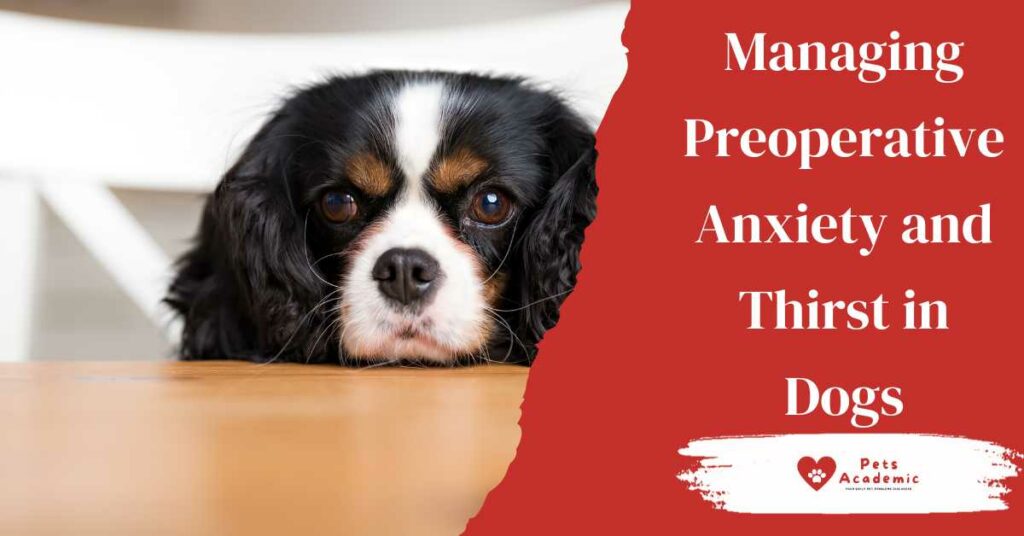
Alright, let’s talk about our furry friends’ state of mind before the big day. Just like us, dogs can feel a mix of excitement and nerves before surgery. And yes, they might get a little extra thirsty.
It’s completely normal for Fido to feel a tad anxious. After all, they’re stepping into an unfamiliar environment with new faces and scents. That’s where you come in—the ultimate source of comfort and reassurance!
One way to ease their pre-surgery jitters is through gentle distractions and soothing activities. Maybe it’s a little extra playtime, a cozy cuddle session, or their favorite toy for comfort.
Trust me, these small gestures go a long way toward keeping their tails wagging!
Now, let’s address the thirst factor. While water might be off-limits closer to the surgery time, it’s crucial to ensure Fido stays hydrated leading up to that point.
Keep a close eye on their water intake in the hours before the restrictions kick in. Think of it as ensuring they’re well-prepared for their short hydration hiatus.
By tending to Fido’s emotional and physical well-being before surgery, you’re not only a pet parent superstar but also setting the stage for a smoother and more comfortable experience for your furry friend.
When Can My Dog Drink Water After Surgery?
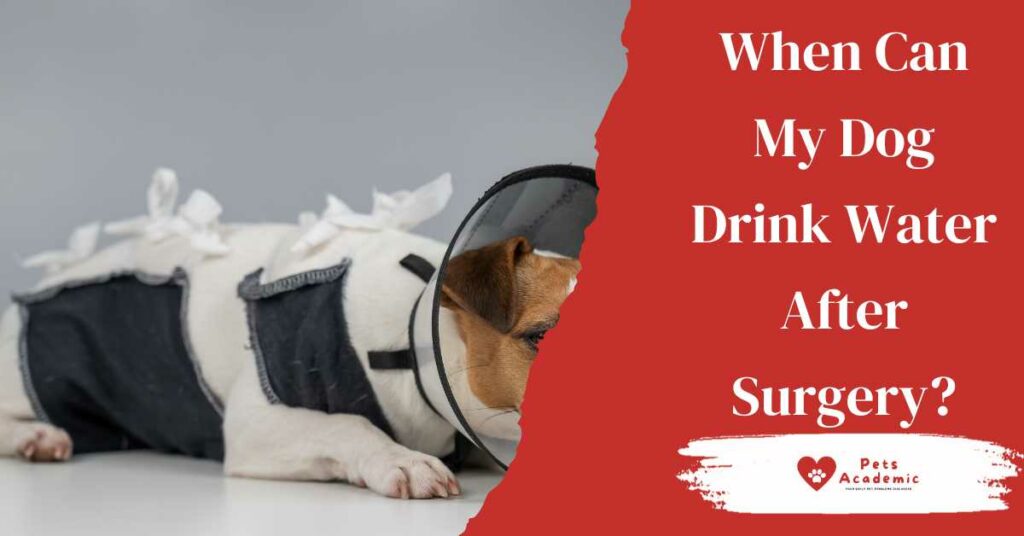
Alright, the surgery is over, and Fido’s on the road to recovery. Now, you might be wondering, “When can my pup quench that thirst?”
Post-surgery, it’s crucial to gradually reintroduce water.
Your vet will provide specific instructions based on Fido’s individual condition and the type of surgery he underwent. They’ll likely start with small, controlled sips to ensure Fido’s stomach handles it well.
It’s a bit like a runner pacing themselves in a marathon. Starting slow and steady ensures a smooth journey to the finish line!
Keep a close eye on Fido’s hydration levels during recovery. Signs of thirst might include increased panting or restlessness. If you notice any of these, don’t hesitate to reach out to your vet for guidance.
Remember, patience is key here. Your furry friend’s health and comfort are top priorities, and allowing them to rehydrate at their own pace is a crucial part of the recovery process.
And with that, we’ve covered the full journey from pre-surgery water restrictions to post-operative hydration. Give your furry friend an extra pat for being a trooper!
Conclusion
Congratulations, pet parent! You’ve navigated the ins and outs of pre-surgery water intake like a pro. Remember, those temporary water restrictions are all about ensuring your furry friend’s safety and a successful operation.
Trust your vet’s guidance and keep the end goal in mind: a healthy, happy pup on the road to recovery. Now, armed with this knowledge, you can confidently support Fido through its surgical journey.
Here’s to a smooth operation, a swift recovery, and many more tail-wagging adventures ahead! Cheers to you and your resilient furry companion! 🐾
Frequently Asked Questions
- Can dogs have water before oral surgery?
In most cases, dogs should refrain from drinking water for about 6–8 hours prior to oral surgery.
This helps ensure a clear and safe working environment for the vet. However, always follow your vet’s specific instructions, as they may have tailored recommendations based on your dog’s individual health and the nature of the procedure.
- How much water is OK before anesthesia?
Generally, it’s advised to withhold water from dogs for about 3-4 hours prior to anesthesia. This helps reduce the risk of regurgitation during the procedure. However, always follow your vet’s specific instructions, as they may provide tailored guidelines based on your dog’s health and the type of surgery they’ll be undergoing.
- What not to do 24 hours before surgery?
In the 24 hours leading up to surgery, avoid giving your dog any food. Follow your vet’s specific instructions regarding water intake. Additionally, refrain from giving any medications or supplements without explicit approval from your vet. Lastly, try to keep your dog calm and minimize stress to ensure a smoother surgical experience.
- What foods should I avoid before surgery?
Before surgery, it’s crucial to avoid feeding your dog any food.
This fasting period helps reduce the risk of complications during the procedure. Additionally, refrain from giving any treats, chews, or table scraps. Stick to following your vet’s specific pre-surgery fasting instructions to ensure your dog’s safety and a successful operation.
